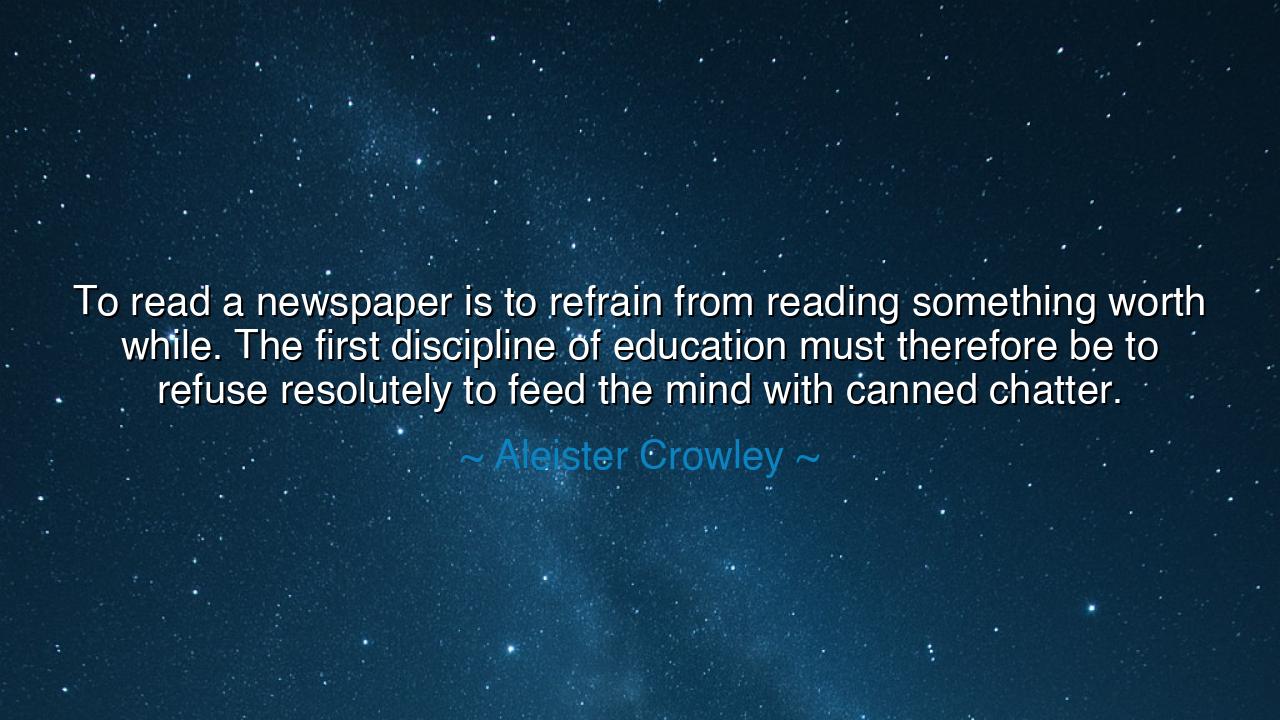
To read a newspaper is to refrain from reading something worth
To read a newspaper is to refrain from reading something worth while. The first discipline of education must therefore be to refuse resolutely to feed the mind with canned chatter.






“To read a newspaper is to refrain from reading something worth while. The first discipline of education must therefore be to refuse resolutely to feed the mind with canned chatter.” — Aleister Crowley
There are voices in history that, though shrouded in controversy, speak truths that blaze through the ages like lightning through storm clouds. Among them is Aleister Crowley, a man often misunderstood — yet in this saying, he speaks not of magic, but of the mind. His words are a challenge to the soul of every age: that wisdom cannot flourish in a mind addicted to noise. He warns us that to fill one’s thoughts with the fleeting, the trivial, and the sensational — what he calls “canned chatter” — is to starve the intellect of substance. True education, he proclaims, begins not with learning what to read, but with the discipline to refuse what is unworthy.
In Crowley’s time, the newspaper was the restless heartbeat of modernity — a constant murmur of gossip, politics, scandal, and distraction. It was a new kind of priesthood, feeding the public its daily portion of outrage and delight. To him, this was a form of enslavement, not enlightenment. For what is a mind that consumes only noise? It becomes reactive, shallow, and restless — a mind trained not to think, but to respond. Thus, Crowley’s declaration was not a dismissal of all news, but a rebellion against the tyranny of the trivial. He saw that the first step in becoming wise is to reclaim one’s attention from the multitude.
The ancients, too, knew this truth. In the days of Rome, the philosopher Seneca wrote of the crowds who gathered in the forum, addicted to gossip and spectacle. “No man,” he said, “can be free who is a slave to the opinions of others.” What are today’s newspapers — or, in our time, endless screens — but the modern forum, where opinions shout and truth whispers? The wise man does not despise information, but he learns to guard the gates of his mind, choosing carefully what he lets enter. For the mind, like the body, becomes what it consumes. Feed it empty chatter, and it weakens; feed it thought and reflection, and it grows strong.
Consider the story of Henry David Thoreau, who withdrew from society to live beside the still waters of Walden Pond. He sought clarity not through constant updates, but through silence. “I never read the newspaper,” he said, “for I am determined to know only the essentials of life.” In solitude, he found not ignorance, but understanding. His knowledge was not of the day’s events, but of life’s eternal laws — of nature, simplicity, and the human spirit. He proved by living that wisdom is not found in the flood of words, but in the stillness between them.
Crowley’s phrase, “canned chatter,” is more prophetic now than ever. Today the chatter no longer comes only from printed pages — it comes from every glowing screen, every device that hums in our hands. We are surrounded by noise disguised as knowledge. We scroll endlessly, learning everything and understanding nothing. The tragedy of our age is not ignorance, but information without reflection. And so, his challenge returns to us: can we silence the clamor long enough to hear our own thoughts? Can we free our minds from the tyranny of distraction and rediscover the art of contemplation?
To do so requires discipline, the very heart of Crowley’s teaching. He does not say “never read,” but “refuse resolutely.” It is not ignorance he urges, but discrimination — the sacred art of knowing what deserves your attention and what does not. The first act of education, therefore, is not to acquire knowledge, but to purify the vessel that receives it. Read what uplifts the soul. Listen to voices that sharpen the mind. Turn away from that which dulls the spirit or feeds only your impulses. For wisdom is not born in chaos, but in silence.
Let this be your lesson: Do not mistake noise for knowledge, nor news for truth. Seek out what endures. Read not what distracts, but what deepens. Learn to say no — not just to others, but to the endless seductions of triviality. The world will always tempt you to fill your mind; the wise learn to empty it first, to make space for what is worthy.
So when you are faced with the choice between canned chatter and quiet contemplation, choose the latter. For in that quiet, the true mind awakens. There, far from the crowd’s clamor, you will begin to think — and thinking, you will begin to see. And when you see, you will understand that education is not the gathering of facts, but the cultivation of the soul.






AAdministratorAdministrator
Welcome, honored guests. Please leave a comment, we will respond soon